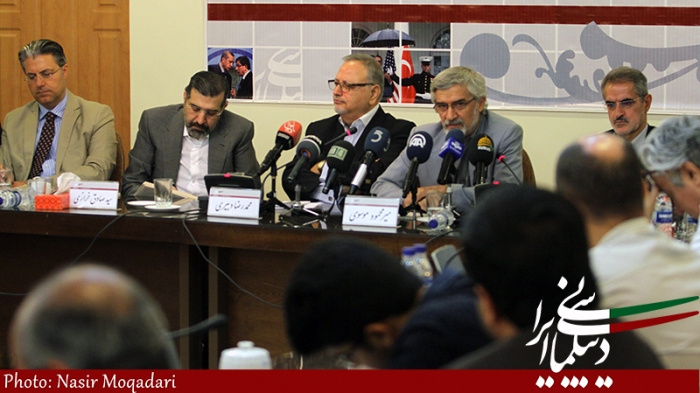Turkey after Coup: Iranian Diplomacy Forum on the failed putsch against Erdogan

(From left: Reza Hakan Tekin, Sadegh Kharrazi, Mohammad-Reza Dabiri (moderator), Mir-Mahmoud Mousavi, Sadegh Maleki)
On Tuesday July 26, 2016, Iranian Diplomacy hosted a forum to discuss the recent coup attempt in Turkey. Ambassador of Turkey to Tehran Riza Hakan Tekin, former ambassador to Pakistan and India Mir-Mahmoud Mousavi, Turkish affairs' analyst Sadegh Maleki, and former ambassador to France Sadegh Kharrazi discussed the putsch, its background, and its consequences.
Turkish ambassador Riza Hakan Tekin was the first speaker of the forum. Tekin, called the failed coup a "bitter incident", expressing pleasure that the "terrorist face" of Fethullah Gülen and his organization" was revealed with this attempt to overthrow Erdogan's government. "The government had knew Gülen organization's plot to assume power since two years ago" and a road map to counter the attempt had been developed accordingly he revealed. Post-coup government arrests were based on that road map Tekin explained. The government's efforts after the struggle have reinforced secularism, solidarity and democracy Ankara envoy to Tehran added. Addressing Tehran's prompt response to the developments of July 15th in Istanbul and Ankara, Riza Hakan Tekin also thanked the Iranian government for condemning the coup, saying that relations between the two countries are time-tested.
Former ambassador to India and Pakistan Mir-Mahmoud Mousavi was the next speaker of the event. Mousavi started with an outline of the situation in Turkey before the coup. "Turkey was not in a normal state at the threshold of the coup" he said, pointing to regional developments, including the rise of ISIS, that had created strong waves influencing Turkey. The aggravation of situation in the Kurdish region of Turkey, a spillover of the Syrian conflict, and the shootdown of a Russian Sukhoi jet were other factors that had created a tense situation in Turkey according to Mousavi. Former ambassador to Pakistan criticized West for its double-standards in dealing with human rights, drawing a comparison between Western response to General Sisi's coup in Egypt, and Erdogan's counter-coup efforts in Turkey. Nonetheless, he advised Erdogan to practice self-restraint. "Arrests will polarize the Turkish society" he warned. "If Erdogan follows Mandela in dealing with his rivals, this could preserve the country's social capital", much needed for further progress of the country Mousavi added.
Turkish affairs' analyst Sadegh Maleki also presented his analysis of the situation in Turkey for the audience. "People's presence was the most important factor that failed the coup" Maleki said. He added that Turkey's and Iran's security are intertwined, and any development in Turkey affects the state of security in Iran. Meanwhile, he questioned the public humiliation of the army, a popular institution in Turkey according to Maleki, warning that it could undermine the military's ability to safeguard to Turkey's security. He reminded the audience of Iraq, where the dissolution of the army after the 2003 invasion paved the way for the rise of ISIS, and warned that weakening the army in Turkey could have dire consequences.
Former ambassador to France and the UN Sadegh Kharrazi was the last speaker of the forum. Kharrazi was explicit in his remarks, criticizing Erdogan for his regional policies. The coup, Kharrazi said, was the boomerang effect of "Erdogan's grave mistakes in Libya, Syria and other parts of the region". In the meantime, he also slammed Fethullah Gülen, accusing him of having ties with American intelligence services and Pentagon. "Americans were definitely aware that a coup was going to take place" Kharrazi said. Despite his criticism of Erdogan, Kharrazi called him and fellow Islamists in Turkey the closest political actors to Iran. "Iran is Turkey's lasting friend, not Qatar or Saudi Arabia who used Turkey to spread their ideology of terrorism" he added. "Iran and Turkey are the two most influential agents for solving regional problems."

